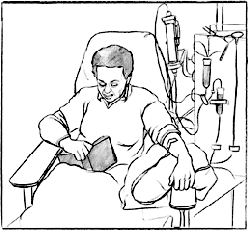 High phosphate blood levels are associated with a higher risk of death due to heart disease in patients with advanced kidney disease. Despite current treatments, only half of patients receiving kidney dialysis maintain recommended phosphate levels.
High phosphate blood levels are associated with a higher risk of death due to heart disease in patients with advanced kidney disease. Despite current treatments, only half of patients receiving kidney dialysis maintain recommended phosphate levels.
Researchers from the US, UK, and Italy assessed the phosphate-binding capacity of the natural polymer chitosan added to chewing gum.
First, the details.
- 13 hemodialysis (kidney dialysis) patients with blood phosphate levels higher than 6.0 mg/dL (normal values = 2.4 to 4.1 mg/dL) despite treatment with sevelamer (Renagel) were studied.
- Patients chewed 20 mg of chitosan-loaded chewing gum twice daily between meals for 2 weeks.
- The gum was used in addition to the prescribed phosphate-binding regimen.
- The effects of the chewing gum regimen on salivary and blood phosphate levels were evaluated for 6 weeks.
And, the results.
- Levels of phosphate in saliva and blood significantly decreased during the first week of chewing.
- After 2 weeks, salivary phosphate levels significantly decreased 55% from the start of the study, and blood levels of phosphate decreased 31%.
- Salivary phosphate levels returned to pre-study levels by day 15 after discontinuing the chewing gum, whereas blood phosphate took 30 days to return to baseline.
- The gum did not affect parathyroid hormone and calcium concentrations in the blood.
The bottom line?
The authors concluded, “Adding salivary phosphate binding to traditional phosphate binders could be a useful approach for improving treatment of hyperphosphatemia in hemodialysis patients.”
It’s a small group of patients. More studies are needed to confirm these results, determine the long-term effects, and explain how chitosan gum lowers saliva levels of phosphate.
Chitosan is sold in tablet form at health stores as a “fat attractor.”
In some patients, the blood “thinner” warfarin (Coumadin) might be given to dialysis patients in an attempt to maintain access to blood vessels. At least 1 expert advises against this practice. However, it should be noted that chitosan has been associated with a higher risk of bleeding in people taking warfarin.
2/21/09 17:13 JR